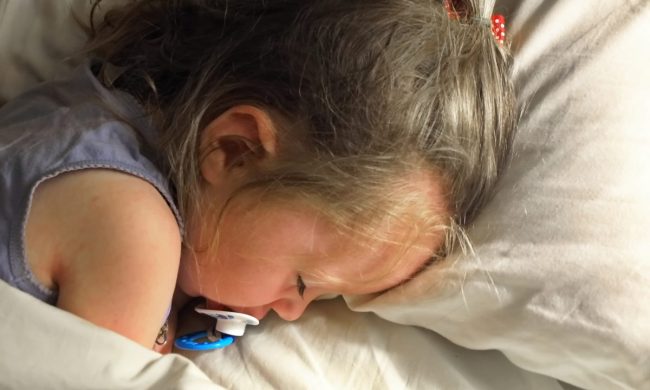Between ages 1 and 2, most children need about 11 to 14 hours of sleep per day, including one to two days of sleep. At 18 months old and sometimes earlier, most children condense their two days of sleep into one day. A child who has trouble sleeping in the morning is probably ready to sleep in the afternoon. Avoid activities that can make your baby fall asleep. It is important to encourage healthy sleeping habits amongst toddlers, and it is advisable to make sure that they sleep 11-14 hours (including daytime sleep) every day. If your child does not sleep the recommended amount of sleep, your little one is likely to have behavioral problems during the day and have trouble sleeping due to exhaustion.
What causes the regression of sleep in a child of 2 years?

There are several potential reasons for your 2-year-old sleeping less or having trouble falling asleep:
- Development results: As your child moves around in their world, they learn new things every day and develop new skills. Sometimes, all this learning and growth can prevent them from sleeping well at night. At 2 years, children experience a jump in their physical abilities, language skills, and social skills, which can lead to more difficult sleep times and more nocturnal awakenings.
- Separation anxiety: Although this may not last long, separation anxiety can still be a problem for this age group. Your child may be more tenacious, have difficulty separating from a parent, or want the parent to be present until he or she falls asleep.
- Changes in sleep time: Around the age of 2, some children begin to sleep when their social calendar starts to fill up. With whole days of family outings and games, it can be difficult to sneak in a midday nap every day. However, when changes occur in the sleep schedule, they almost always affect the night routine. If the child stopped sleeping, began to sleep for shorter periods during the day, or resists sleep in the afternoon, it can also affect night sleep.
- Being exhausted: While most adults tend to lie down when they are overloaded with work, children often do the exact opposite. When your baby starts to push back at bedtime later, your little one often starts to get tired. This period can be difficult for them to calm down enough to fall asleep easily.
- Teething: Many young children receive only their 2-year-old molars, which can be uncomfortable or painful. If your child has pain or discomfort due to teething, it is not uncommon to affect their ability to sleep all night peacefully.
Daytime habits that support night rest
In some cases, the child’s inability to fall asleep is associated with daytime behavior. This applies mainly to toddlers and teenagers. Establishing good life habits helps to ensure a good night’s sleep at any age:
- Make sure your child’s bed is strictly for sleeping. Teach them to use the bed only for sleep or the ritual of sleeping (reading a book, for example). Otherwise, the brain will unconsciously begin to associate the bed with other activities.
- Make sure the room is comfortable. Is the room quiet? If your child is afraid of staying in the dark, then a low-light night light is quite acceptable. Most people sleep better in a slightly cold room (about 65 degrees).
- Make sure that your baby’s bed is not overloaded with toys. This can become a distraction before bedtime. One or two toys is normal.
- Try to comply with the same sleep schedule, even on weekends. This will make it easier for your baby to wake up and fall asleep naturally. On weekends, teenagers do not need to sleep more than an hour after the usual wake-up time. If they do, it means that they do not get enough sleep for the week.
- Avoid giving children foods that contain caffeine, especially in the afternoon or evening. These include soft drinks, coffee, tea or chocolate. However, a little chamomile can help the body relax.
- Do not use the child’s room for downtime. They will learn to associate the room with punishment instead of rest and relaxation.
- Do not let the child lie down too hungry or too full. A light snack (like hot milk and a banana) before going to bed is a good idea. However, eating heavily for an hour or two before bedtime can prevent children from falling asleep.
- Encourage natural light in the morning. Opening a window helps us rise up shining and marks the beginning of the day.

Although the regression of 2-year old’s sleeping pattern is certainly frustrating for parents, it is normal for development and is frequent in young children. If your child suddenly has trouble sleeping, often wakes up at night or wakes up too early, it is important to solve all the underlying problems and stay patient until the regression passes. Fortunately, with constancy and patience, this regression of sleep is likely to pass in a few weeks.


